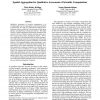Free Online Productivity Tools
i2Speak
i2Symbol
i2OCR
iTex2Img
iWeb2Print
iWeb2Shot
i2Type
iPdf2Split
iPdf2Merge
i2Bopomofo
i2Arabic
i2Style
i2Image
i2PDF
iLatex2Rtf
Sci2ools
120
Voted
AAAI
2004
2004
Spatial Aggregation for Qualitative Assessment of Scientific Computations
Qualitative assessment of scientific computations is an emerging application area that applies a data-driven approach to characterize, at a high level, phenomena including conditioning of matrices, sensitivity to various types of error propagation, and algorithmic convergence behavior. This paper develops a spatial aggregation approach that formalizes such analysis in terms of model selection utilizing spatial structures extracted from matrix perturbation datasets. We focus in particular on the characterization of matrix eigenstructure, both analyzing sensitivity of computations with spectral portraits and determining eigenvalue multiplicity with Jordan portraits. Our approach employs spatial reasoning to overcome noise and sparsity by detecting mutually reinforcing interpretations, and to guide subsequent data sampling. It enables quantitative evaluation of properties of a scientific computation in terms of confidence in a model, explainable in terms of the sampled data and domain kn...
AAAI 2004 | Intelligent Agents | Matrix Perturbation Datasets | Scientific Computation | Spatial Aggregation Approach |
Related Content
| Added | 30 Oct 2010 |
| Updated | 30 Oct 2010 |
| Type | Conference |
| Year | 2004 |
| Where | AAAI |
| Authors | Chris Bailey-Kellogg, Naren Ramakrishnan |
Comments (0)

